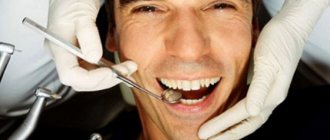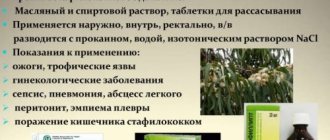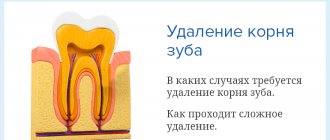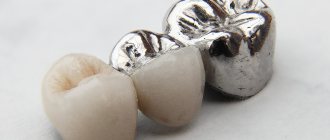Sore throat is not a symptom of caries and is characteristic of other diseases: tonsillitis, laryngitis and pharyngitis. But this does not mean that these pathologies are not related. One of them may cause the development of others. We will find out what connection there is between a sore throat and dental caries and tell you what to do if it occurs.
In this article
- What is caries: causes and mechanism of development
- Stages of caries
- Complications of carious lesions: can your throat hurt due to caries?
- Sore throat due to tonsillitis
- Laryngitis and sore throat
- Pharyngitis and sore throat
- Caries and lymphadenitis
- How to avoid caries complications
- What dental pathologies can cause a sore throat?
- Is it possible to treat teeth if your throat hurts?
- General recommendations for dental care
Typically, people associate a symptom such as a sore throat with a sore throat - an acute infection of the tonsils. Indeed, with this disease a person always has a sore throat, which should already be a reason to visit a doctor. However, there are other possible causes for this symptom.
Can it cause tooth decay? This is not possible directly: a sore throat is not one of the components of the symptoms of a carious lesion. But it can lead to throat problems indirectly, that is, through other pathologies, provoking them or increasing the risk of their occurrence. We will tell you how caries develops, what complications it leads to and why.
What is caries: causes and mechanism of development
Caries is a pathological process that destroys the hard tissues of the tooth - enamel and dentin. It occurs when cariogenic microorganisms actively multiply in the oral cavity, releasing harmful acids. They reduce the pH of the oral fluid, oxidize the enamel and destroy its structure, leaching various microelements from it. It does not have time to recover naturally and cannot protect the internal tissues of the tooth from external influences.
Caries develops under the influence of many factors, including:
- poor hygiene;
- improper growth of teeth;
- excessive consumption of sweets;
- smoking;
- weak immunity, etc.
About 90% of people suffer from this pathology to one degree or another. However, it is not difficult to cure it, at any stage. To do this, you just need to contact your dentist in time and start treatment. If you ignore the symptoms of tooth decay, it can cause complications, some of which are accompanied by a sore throat.
Stages of caries
Doctors distinguish 4 stages of caries, which determine the method of its treatment. Each of them has its own symptoms. At the first stage (initial), a chalky (white) stain forms on the tooth surface, which indicates the process of demineralization of the enamel. It becomes less calcium, fluorine and other trace elements. At the same time, it does not have time to recover naturally and slowly collapses.
At the second stage (superficial), the pathology penetrates deep into the enamel, but continues to remain within its boundaries, without affecting the dentin. There is no carious cavity at this stage yet, but the patient is already worried about the first symptoms of the disease: his tooth may hurt when eating sweet foods, or less often - hot and cold. The pain subsides after the stimulus is removed.
At the third stage (middle), a carious cavity is formed - a cone-shaped hole of a brownish color. Bacteria quickly multiply in it and penetrate the dentin. Pain occurs when there are temperature changes, from sweet and sour foods, and also when brushing your teeth.
At the fourth stage (deep), the carious cavity is a large hole of almost black color. A person’s breath constantly smells bad, the tooth hurts often, and the pain is sharp and sharp. It can occur at rest. There is a risk of caries spreading to the soft tissues inside the dentin, that is, to the pulp.
Contraindications to treatment for colds
You need to cancel your visit to the dentist in the following cases:
- If toothache is treated with painkillers, and the symptoms of ARVI are not more severe than usual, then there is no need for dental treatment for a cold.
- Feverish conditions caused specifically by a cold are a contraindication to any interventions.
- Tooth extraction during a cold must be rescheduled, as there is a high risk of infection of the socket.
- If aspirin and drugs containing acetylsalicylic acid were taken during the treatment of ARVI, then any manipulations should be postponed for at least a week, since these drugs significantly increase the risk of bleeding even with minor interventions.
- Lack of breathing through the nose. Nasal congestion is a serious obstacle to dental care, as standing with your mouth open for long periods of time can cause severe discomfort.
- If you experience dizziness and severe weakness, it is not advisable to undergo any dental intervention, as it can further worsen your health.
The main thing to remember is that the decision on the advisability or otherwise of dental treatment will be made by the doctor. If you have doubts about the safety of postponing a visit to the dentist, contact a specialist and describe your situation to him. A qualified specialist will be able to identify risk factors that make it reasonable to contact him even during a cold.
Complications of carious lesions: can your throat hurt due to caries?
A carious lesion is a permanent source of infection. Bacteria, mainly streptococcal bacteria, multiply in it, which can spread to other parts of the oral cavity: gums, tongue, mucous membrane or throat.
Under certain conditions, for example, after hypothermia, with reduced immunity or during a cold, these microbes can provoke infectious diseases, including tonsillitis, laryngitis and pharyngitis. These diseases may cause a sore throat. Let's briefly look at their features.
Sore throat due to tonsillitis
Tonsillitis develops when pathogenic bacteria and viruses, including streptococci, which cause caries, enter the tonsils. Often, the causative agent of the disease penetrates the oral cavity and enters the throat along with inhaled air or food. However, an endogenous variant of infection is also possible, when microbes infect tonsil tissue from foci of infection in the oral cavity. The development of the infectious process is also facilitated by:
- tonsil injuries;
- chronic diseases of the mouth and nose;
- violation of nasal breathing;
- various somatic diseases.
Tonsillitis can occur in acute and chronic forms. An exacerbation of this pathology is also called sore throat, which is always accompanied by a sore throat. Inflammation of the tonsils also has other symptoms, which depend on the type and form of the disease.
Typical signs of tonsillitis are:
- sore throat that gets worse when swallowing;
- irradiation of pain into the ear;
- increased body temperature;
- putrid breath odor;
- general weakness, decreased performance;
- headaches, muscle and joint pain;
- dry cough.
In very severe cases, severe swelling of the tonsils is possible, which makes breathing difficult. Tonsillitis is treated therapeutically using antiviral, antibacterial and antifungal agents, as well as antibiotics.
Laryngitis and sore throat
Laryngitis is an inflammation of the larynx that is infectious in nature. The inflammatory process can develop as an independent disease or as a complication of systemic infections, for example, measles, ARVI, influenza, etc. Depending on the form and type of laryngitis, it can be accompanied by various symptoms.
Common features are:
- Swelling of the throat. Patients complain of a feeling of squeezing in the neck, as if a tight bandage had been placed on it.
- Hoarseness of voice. It gets worse when a person raises their voice or speaks for a long time.
- Discomfort when swallowing, especially cold and hot foods.
- A sore throat, a constant desire to cough, causing the throat to become even more irritated.
- Accumulation of mucous secretions in the throat; it seems to a person that they are flowing directly from the nasal cavity.
Pain in the throat occurs only when swallowing; The pain cannot be called strong and intense, but it causes a lot of inconvenience. In addition, headaches occur, body temperature rises to approximately 38°, and weakness and malaise bothers you.
Is it possible to treat teeth if you have a cold?
90% of specialists will answer this with a firm “no,” citing the following arguments:
- A healthy body has more strength for regeneration, which will be needed to heal inflamed gums, mucous membranes, sprout new nerve endings and stop bleeding.
- The effect of local anesthetics is reduced, because During inflammatory processes in tissues, the pH of the environment changes to the acidic side. A large dose of the same procaine is required to achieve complete pain relief. Increased doses of medications can cause allergic reactions. Considering that the manipulations are carried out near the throat, this is fraught with Quincke's edema.
- With a wet cough, sputum is actively expelled. At the most inopportune moment, you can cough in the doctor’s face, and healing also worsens. Sputum is characterized by the content of not only dead microorganisms, but also living, pathogenic ones. If it gets on inflamed gums, it can cause infection and complications including osteitis (bone inflammation) and sepsis.
Pharyngitis and sore throat
Pharyngitis is an inflammation of the pharyngeal mucosa that is caused by bacteria, viruses and fungi. More often, a person becomes infected with this disease through inhaled air and food, but other routes of infection are also possible, for example, from a carious tooth. With this disease, the throat hurts and the temperature rises to 37.5-38 °C.
Depending on the type and form of the pathology, the following symptoms may occur:
- redness of the throat;
- rashes on the oral mucosa;
- purulent plaque on the throat;
- runny nose, dry cough, tickling;
- weakness and fatigue;
- muscle pain.
Pharyngitis can be caused not only by caries, but also by other dental diseases, including stomatitis. Inflammation of the pharyngeal mucosa can be treated quickly enough, but complete lack of treatment leads to the development of chronic pharyngitis.
Features of the disease
There is a widespread misconception about the safety of colds for an adult; most people disdain the need for bed rest and limiting exercise until complete recovery. When the first signs of ARVI appear: sore throat, nasal congestion, treatment should begin, ideally under the supervision of a qualified specialist. Complications after a cold are common: kidney and heart diseases. After the first signs, a cough, runny nose begins, the temperature rises, and the disease develops rapidly. Many suffer from a cold “on their feet”, doing their usual things, visiting public places, limiting themselves to taking modern medications that do not cure, but relieve symptoms.
ARVI is a threat to others; viruses live indoors for more than 7 hours. A visit to the dental office by a sick person is accompanied by the risk of infection of staff and visitors. Dental treatment during ARVI is a risk for the patient himself; the weakened body does not resist and is not protected from other infections and viruses.
Caries and lymphadenitis
Tooth decay can negatively affect the lymphatic system. Lymph nodes act as filters in the body, trapping harmful microbes and destroying them. Lymph nodes are also involved in strengthening the immune system.
Due to the spread of cariogenic bacteria, for example, with advanced caries, inflammation of the lymph nodes can occur. They increase in size and hurt. One possible symptom of lymphadenitis is pain when swallowing. Inflammation can be eliminated with the help of medications, but it will occur again if the underlying disease is not treated, in this case, caries.
How to avoid caries complications
The main danger is advanced caries, which at any time can provoke pulpitis, periodontitis, lymphadenitis and other pathologies. If a person has a weak immune system, the likelihood of these complications increases many times over. The best way to avoid them is to treat tooth decay on time. Dentists recommend coming for an examination every six months, during which even hidden forms of carious lesions can be identified at the initial stage and treated.
At the first and second stages, when a carious cavity has not yet formed, remineralization is carried out - saturation of the enamel with minerals. A composition enriched with calcium and fluoride is applied to the tooth surface, which allows you to quickly restore the enamel structure and normalize the balance of microelements in the oral fluid. Remineralization is prescribed in a course lasting from 5 to 15 sessions, depending on the condition of the teeth. To enhance the remineralization therapy, the patient should use toothpastes, gels and rinses with minerals: Mirafluor C Toothpaste with Amine Fluoride, DRC ROCS (ROCS) Medical Minerals and Vivax "Remineralization". During treatment you need to give up smoking and sweets.
If there is a carious cavity, the dentist prepares the diseased tooth, that is, cleanses the cavity of dead tissue, and installs a filling. In some cases, when soft tissue is involved in the pathological process, the pulp is removed. If the tooth is severely damaged, dentures may be required. If none of these methods is suitable, the diseased tooth is extracted. An implant can be installed instead.
Of course, a sore throat can occur not only because of the listed diseases and caries, as one of the reasons for their occurrence. There are other pathologies that are accompanied by this symptom. We'll tell you what dental diseases it appears in.
What services are provided by Aesthetica dentistry during the coronavirus quarantine?
Our dentistry “Aesthetica” is working in a special mode during the coronavirus quarantine period. We accept patients only for acute pain and emergency conditions requiring urgent dental treatment. These conditions include:
- Severe toothache;
- Swelling of the gums, swelling of the cheek or face;
- Continuous bleeding after tooth extraction;
- Serious injuries to teeth, gums, tongue, jaw;
- Flux;
- Pulpitis, periodontitis, periostitis;
- Emergency care is required for patients undergoing orthodontic treatment when the arch of braces is damaged, the locks of the system come off, damage to soft tissues and teeth;
- Reimplantitis;
- The occurrence of complications after prosthetics, manifesting themselves as acute pain and swelling of the gums.
To get an appointment with our dentists before the end of the self-isolation regime introduced to prevent the spread of coronavirus, you need to make an appointment by calling the clinic phone number, which is listed on our website. To visit a dentist, we advise you to choose the Aesthetica branch that is located as close as possible to your place of residence - in Barvikha or in Podsosensky Lane.
What dental pathologies can cause a sore throat?
The throat hurts due to stomatitis, improper eruption of wisdom teeth and periodontitis. The most insidious of these diseases is stomatitis - inflammation of the oral mucosa that develops as a result of injuries, infections and allergies. Because of it, many small ulcers form in the mouth, each of which is a source of bacteria. Stomatitis often goes away on its own, so rarely does anyone go to the hospital with it. However, this is the danger of the pathology - it can cause other diseases, including sore throat.
The main signs of stomatitis are ulcers on the oral mucosa and pain while eating. There may also be a discharge of translucent exudate, the formation of white plaque and swelling of the gums. In severe cases, when a person has a weak immune system, the temperature rises, chills and fever bother them.
A sore throat may be caused by the eruption of wisdom teeth. First, pain appears in the gums. If it grows in the wrong direction, it can injure the mucous membrane and lead to the development of inflammation. The pain is localized in the throat and lower neck, and the lymph nodes are often inflamed.
If your throat hurts, but there are no signs of laryngitis, pharyngitis, tonsillitis, an examination is carried out for the presence of periodontitis - an inflammatory disease of the tissues surrounding the tooth. As a rule, it occurs due to non-compliance with hygiene rules. Caries can also cause periodontitis.
Inflammation is accompanied by pain when severe. The throat is not involved in the pathological process, but the patient may complain of pain when chewing and swallowing. Treatment of periodontitis is carried out by cleaning gum pockets and antibacterial therapy.
Stages of the procedure
Simple extirpation is carried out using forceps, consisting of cheeks, a handle, and a lock. It is performed if the coronal part is well preserved and there are no various complications. Incisors and canines on the upper jaw are removed with straight forceps, on the lower jaw - curved at an angle of 90 degrees. S-shaped instruments are used to extract premolars and molars.
Removing an upper wisdom tooth is easier than on the lower jaw, since it has an even, small root, so a simple operation is performed if there are no complications. The lower jaw bone is denser and more massive, and the root part of the figure eight is complex.
A simple extraction consists of several steps:
- local anesthesia;
- antiseptic treatment;
- application of forceps followed by advancement of the cheeks under the gums and fixation;
- rocking, dislocation and extraction of a dental unit from the socket.
Complex extirpation requires the use of several different instruments, takes a longer time, injures nearby tissues, is dangerous for complications, and the rehabilitation process lasts longer. Pain relief during tooth extraction, especially eights, can be general. The surgeon uses a scalpel or laser, drill, elevator, excavator, and other instruments.
Step-by-step complex removal:
- local or general anesthesia;
- antiseptic treatment;
- dissection of the gums, separation of the flap from dental and bone tissues;
- if necessary, drilling or cutting off part of the bone, dividing the root into several fragments;
- extraction of a dental unit in whole or in parts;
- bleeding stop;
- application of antibacterial and anti-inflammatory drugs;
- suturing the gum.
To stitch soft tissues, self-absorbing or non-absorbable threads are used, which are removed after 7-10 days.
General recommendations for dental care
If you follow a number of rules, your teeth and throat will hurt less often:
- brush your teeth twice a day;
- change your toothbrush every three months;
- use irrigators to clean the oral cavity;
- rinse your mouth after every meal;
- use dental floss for additional hygiene;
- Visit your doctor every six months for ultrasonic cleaning.
Do not ignore symptoms such as sore throat, inflammation of the lymph nodes, ulcers on the oral mucosa, etc. If they appear, consult a doctor immediately.
Features of treatment and tooth extraction
Dental treatment during ARVI has some features. Firstly, the patient’s immunity decreases, and as a result, the likelihood of developing complications increases. Secondly, it will be uncomfortable for a patient with a fever and runny nose to sit with his mouth open and his head thrown back for a long time. Thirdly, many types of treatment are surgical, and during illness it is dangerous to remove teeth, make incisions or install drainage.
At the same time, sometimes it is necessary to remove a tooth even if you have a cold. In this case, the doctor must take all precautions. Before surgery, disinfect the oral mucosa, surfaces of teeth and lips. After the procedure, treat the open wound with an antiseptic drug, prescribe the patient antibiotics, immune stimulants, and drugs that will promote tissue regeneration.
Note. Be sure to notify your doctor if you are taking antipyretic or painkillers, as they may be incompatible with medications used in dentistry.











